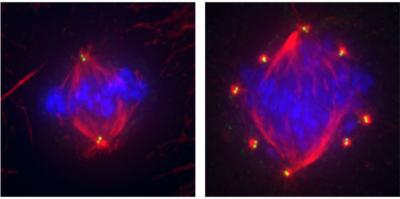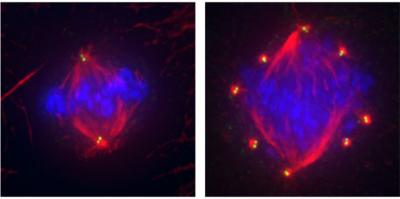
Credit: Gaëlle Marteil, IGC.
A research team led by Monica Bettencourt Dias, from Instituto Gulbenkian de Ciencia (IGC, Portugal), discovered important features of cancer cells that may help clinicians fighting cancer.
The researchers observed that the number and size of tiny structures that exist inside cells, called centrioles, are increased in the most aggressive sub-types of cancer. This study will be published in Nature Communications* on the 28th of March.
Cancer is a very diverse disease with some tumours being more aggressive and more resistant to chemotherapy than others. Clinicians are eager to find novel diagnostic, prognostic and treatment tools that allow them to predict outcomes and treat patients in a more personalised way. The study now published may contribute to this process.
About 100 times smaller than the cross section of a hair, centrioles have been called the cell´s "brain", as they play crucial roles in cell multiplication, movement and communication. Their number and size are highly controlled in normal cells. Since their discovery, more than one century ago, it has been proposed that an abnormal increase in the number of these structures may induce cancer..
Bettencourt-Dias's team investigated the incidence of centriole abnormalities in human cancer cells. The researchers thoroughly analysed a panel of 60 human cancer lines originated from 9 distinct tissues. Their results reveal that cancer cells often have extra and longer centrioles, which are absent in normal cells. Importantly, the research team observed that supernumerary centrioles are more prevalent in aggressive breast – as the triple negative – and colon cancer. Also, the team discovered that longer centrioles are excessively active, which perturbs cell division and could favour cancer formation.
"Our data confirm that deregulated number and size of centrioles inside cells is associated with malignant features. This finding may help establishing centriole properties as a way of classifying tumours in order to establish prognosis and predict treatment response", says Gaelle Marteil, first author of this study and researcher at Bettencourt-Dias laboratory.
What is the next step? "The cell lines that we analysed are already well characterized in terms of genetic changes and resistance to therapeutics. We are pursuing our studies in collaboration with Nuno Barbosa-Morais' team at Instituto de Medicina Molecular, in Lisbon, and Joana Paredes at I3S, in Porto, to explore new mechanisms and therapeutics that could target centrioles in cancer", adds Monica Bettencourt-Dias.
###
This study involved an international research team from Instituto Gulbenkian de Ciencia, I3S- Instituto de Investigação e Inovação em Saúde (Portugal), IPATIMUP – Instituto de Patologia e Imunologia Molecular (Portugal), Instituto de Medicina Molecular (Portugal), Instituto Portugues de Oncologia (Portugal), and Dana-Faber Cancer Institute (USA). This work was funded by European Research Council (ERC), European Molecular Biology Organization (EMBO), Fundação para a Ciencia e a Tecnologia (FCT, Portugal), and FCT- Harvard Medical School Program Portugal.
* Marteil, G., Guerrero, A., Vieira, A.F., de Almeida, B.P., Machado, P., Mendonça, S., Mesquita, M., Vilarreal, B., Fonseca, I., Francia, M.E., Dores, K., Martins, N.P., Jana, S.C., Tranfield, E.M., Barbosa-Morais, N.L., Paredes, J., Pellman, D., Godinho, S.A., Bettencourt-Dias, M. (2018) Over-elongation of Centrioles in Cancer Promotes Centriole Amplification and Chromosome Missegregation. Nature Communications. DOI: 10.1038/s41467-018-03641-x.
Media Contact
Ana Mena
[email protected]
351-214-407-959
@IGCiencia
http://www.igc.gulbenkian.pt
Related Journal Article
http://dx.doi.org/10.1038/s41467-018-03641-x





